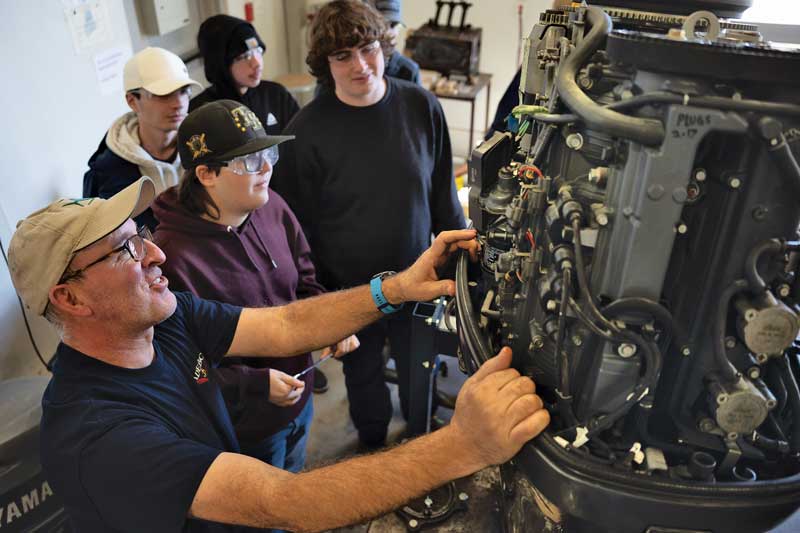 Boatbuilder and instructor Leon MacCorkle explains to Lincoln Academy students how various parts of an outboard engine work. Photo courtesy Lincoln Academy
Boatbuilder and instructor Leon MacCorkle explains to Lincoln Academy students how various parts of an outboard engine work. Photo courtesy Lincoln Academy
This winter, a group of students at Lincoln Academy in Newcastle, Maine, are spending a couple of hours every other school day taking apart outboard motors, learning about marine electrical systems, and getting an inkling of what it’s like to work in a boatyard. The idea, of course, is that one day, after finishing high school, at least some of them will find a place somewhere in Maine’s sprawling marine sector.
A key player in this effort to establish an employee pipeline is Leon MacCorkle, co-owner of Padebco, a full-service yard and custom boatbuilder in Round Pond. With boats to haul, service, store, and launch in the spring, he says he’d hire two more employees tomorrow—if he could find them.
And he knows he’s not alone. MacCorkle just completed a stint as president of the Maine Marine Trades Association, whose members up and down the coast wake up with workforce headaches every morning. Boatyards, fishermen, aquaculture companies, boatbuilders, and even the ferries that serve the islands all have help-wanted signs out.
It’s a curious coincidence that MacCorkle is also on the board of the American Boat and Yacht Council, which sets technical standards for building and maintaining vessels. Several years ago, ABYC developed an entry-level text book and curriculum that’s now taught in about 60 high schools, technical schools and community colleges across the country, according to Tim Murphy, who helped write the text and is currently ABYC’s education director.
A couple of years ago, MacCorkle, who has two daughters who attend Lincoln Academy, approached the school to suggest it add the ABYC program to other offerings at the school’s Midcoast Workshop, an applied learning center whose mission is to create “options for all learners that are responsive to and reflective of our local community.”
Maya Crosby, director of Applied Learning, says the academy enjoys a unique relationship with those who live and work on the Pemaquid peninsula. Local businesses invest in the school, and in turn, the academy works together with them to support the local economy.
To get the marine program started, an advisory board was put together, but funding the program was an issue at the outset. A trial class was held last year to gauge student interest before rolling out the formal ABYC program. MacCorkle brought in damaged marine engines and talked about the mechanics of motors. The trial was a success and McCorkle had a waiting list for the ABYC class.
This year he reached out to a few local builders, and in under a week, raised $8,000. Besides Padebco, backers of the ABYC class include Sabre and Back Cove, Hodgdon Yacht Services, and Washburn & Doughty.
Though the initial cost of the program was taken care of, MacCorkle said staffing issues threatened implementation, so he stepped in to volunteer—for the winter trimester at least—to get things off the ground. Every other day, just before lunch, he’s back in the classroom teaching the ABYC lesson plan.
“So far it’s been well received,” MacCorkle said. “We’re covering a lot of different things that are marine systems related. We’re doing electrical, plumbing, gas engines, diesel engines and outboards. So we’re doing all kinds of stuff. It moves pretty quick, it’s not in depth. It covers most everything you might find in a boat situation.”
The idea of the program, notes Murphy, is to provide students who pass an exam at the end with an entry level certificate that says to potential employers that they know how engines work, how corrosion affects metals in salt water, electrical system basics, and the like. It also demonstrates the student has put some effort toward a possible marine industry career.
With spring approaching and a new trimester soon to begin, the program faces two new challenges. First, Padebco, like other yards, is about to enter the busy season, which means Crosby is trying to find a replacement instructor. And secondly, the school needs additional funding to support the marine program. Toward that end, the academy is actively pursuing grant opportunities and donations.
For the businesses strapped for employees (or boat owners who may someday need their vessel fixed), it might be a good investment. Care to help out? If so, contact Crosby by email at crosby@lincolnacademy.org.
✮






